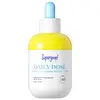What's inside
What's inside
 Key Ingredients
Key Ingredients

 Benefits
Benefits

 Concerns
Concerns

 Ingredients Side-by-side
Ingredients Side-by-side

Butyl Methoxydibenzoylmethane 2%
UV AbsorberHomosalate 9%
Skin ConditioningEthylhexyl Salicylate 5%
UV AbsorberOctocrylene 10%
UV AbsorberCaprylic/Capric Triglyceride
MaskingC12-15 Alkyl Benzoate
AntimicrobialDicaprylyl Ether
EmollientButyloctyl Salicylate
Skin ConditioningPolybutene
Ethyl Olivate
EmollientRosa Canina Seed Oil
EmollientJojoba Oil/Macadamia Seed Oil Esters
Skin ConditioningHydrogenated Polycyclopentadiene
Squalane
EmollientGlycine Soja Oil
EmollientSimmondsia Chinensis Seed Oil
EmollientSqualene
EmollientPolyglyceryl-3 Diisostearate
EmulsifyingTocopherol
AntioxidantOryza Sativa Extract
AbsorbentOryza Sativa Germ Extract
EmollientAvena Sativa Kernel Oil
Skin ConditioningPhytosteryl Macadamiate
Skin ConditioningCeramide NP
Skin ConditioningOlea Europaea Leaf Extract
PerfumingBacillus Ferment
Skin ConditioningPhytosterols
Skin ConditioningRicinus Communis Seed Oil
MaskingSodium Hyaluronate
HumectantHelianthus Annuus Seed Wax
Skin ConditioningButyl Methoxydibenzoylmethane 2%, Homosalate 9%, Ethylhexyl Salicylate 5%, Octocrylene 10%, Caprylic/Capric Triglyceride, C12-15 Alkyl Benzoate, Dicaprylyl Ether, Butyloctyl Salicylate, Polybutene, Ethyl Olivate, Rosa Canina Seed Oil, Jojoba Oil/Macadamia Seed Oil Esters, Hydrogenated Polycyclopentadiene, Squalane, Glycine Soja Oil, Simmondsia Chinensis Seed Oil, Squalene, Polyglyceryl-3 Diisostearate, Tocopherol, Oryza Sativa Extract, Oryza Sativa Germ Extract, Avena Sativa Kernel Oil, Phytosteryl Macadamiate, Ceramide NP, Olea Europaea Leaf Extract, Bacillus Ferment, Phytosterols, Ricinus Communis Seed Oil, Sodium Hyaluronate, Helianthus Annuus Seed Wax
Water
Skin ConditioningButyloctyl Salicylate
Skin ConditioningGlycerin
HumectantIsohexadecane
EmollientCarthamus Tinctorius Oleosomes
EmollientNiacinamide
SmoothingDimethicone
EmollientC12-15 Alkyl Benzoate
AntimicrobialPolyglyceryl-10 Stearate
Skin ConditioningAmmonium Acryloyldimethyltaurate/Vp Copolymer
Theobroma Cacao Seed Extract
AntioxidantDimethicone Crosspolymer
Emulsion StabilisingXanthan Gum
EmulsifyingParfum
MaskingButylene Glycol
HumectantCitric Acid
BufferingSodium Benzoate
MaskingTocopheryl Acetate
AntioxidantCoumarin
PerfumingHexyl Cinnamal
PerfumingLimonene
PerfumingLinalool
PerfumingWater, Butyloctyl Salicylate, Glycerin, Isohexadecane, Carthamus Tinctorius Oleosomes, Niacinamide, Dimethicone, C12-15 Alkyl Benzoate, Polyglyceryl-10 Stearate, Ammonium Acryloyldimethyltaurate/Vp Copolymer, Theobroma Cacao Seed Extract, Dimethicone Crosspolymer, Xanthan Gum, Parfum, Butylene Glycol, Citric Acid, Sodium Benzoate, Tocopheryl Acetate, Coumarin, Hexyl Cinnamal, Limonene, Linalool
Ingredients Explained
These ingredients are found in both products.
Ingredients higher up in an ingredient list are typically present in a larger amount.
Butyloctyl Salicylate is a chemical UV filter structurally similar to octisalate. It is a photostabilizer, SPF booster, emollient and solvent. This ingredient helps evenly spread out ingredients.
According to a manufacturer, it is suitable for pairing with micro Titanium Dioxide, Zinc Oxide, and pigments.
Photostabilizers help stabilize UV-filters and prevents them from degrading quickly.
Learn more about Butyloctyl SalicylateC12-15 Alkyl Benzoate is made up of Benzoic Acid and long chain alcohols. It has a low molecular weight.
C12-15 Alkyl Benzoate is an emollient and texture enhancer. Due to its solubility, it is often used in sunscreens to help evenly distribute active ingredients.
As an emollient, C12-15 Alkyl Benzoate helps soften and hydrate your skin. Emollients create a film on your skin that traps moisture within.
This ingredient has been reported to cause eye irritation.
Learn more about C12-15 Alkyl Benzoate